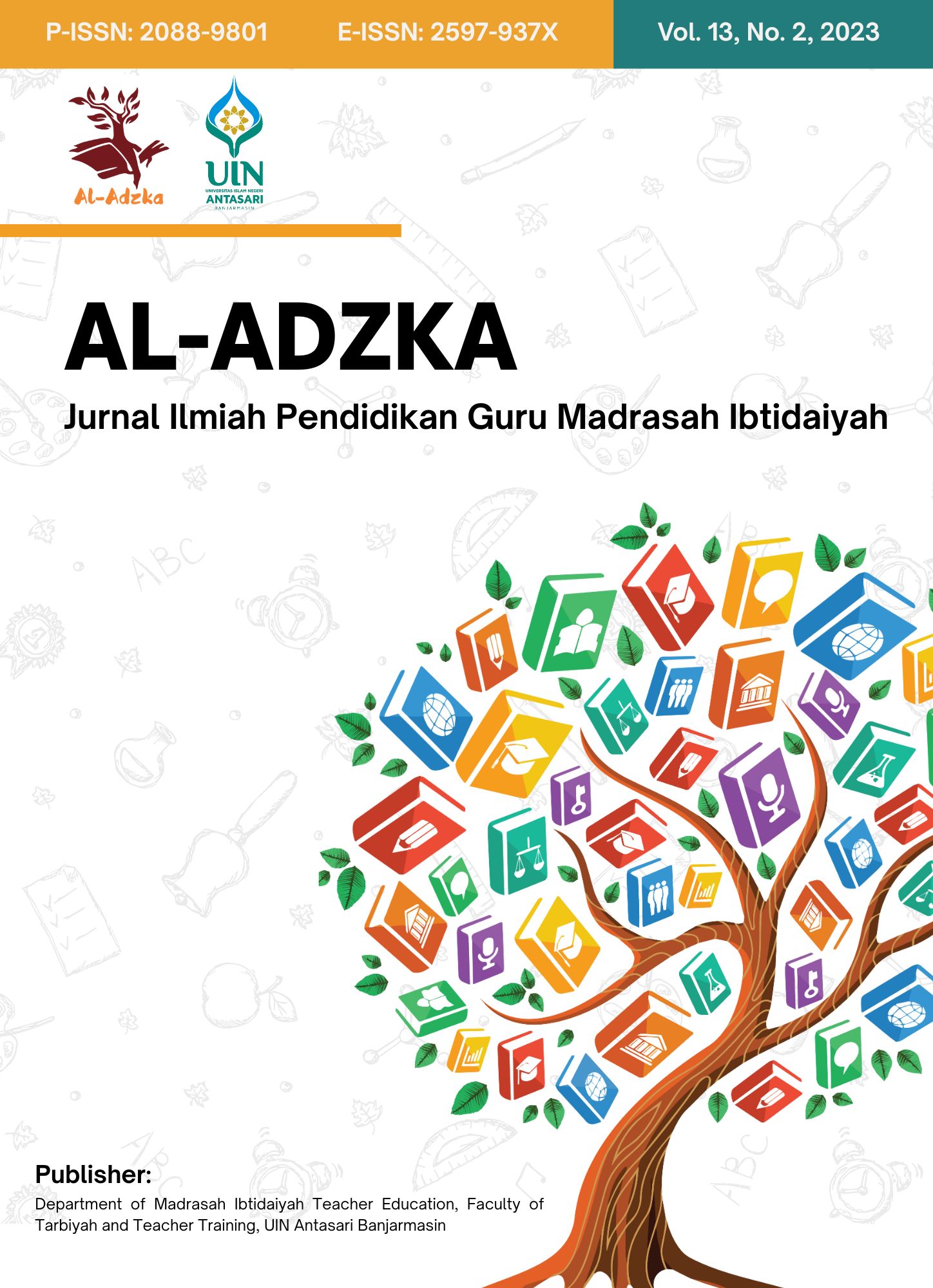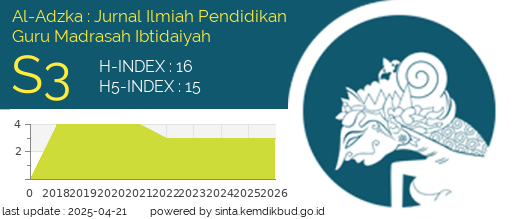The Influence of the STEAM Learning Model on Mathematics Learning Outcomes in Percent Material
DOI:
https://doi.org/10.18592/aladzkapgmi.v13i2.11307Keywords:
Mathematics; STEAM Model; Student Learning OutcomesAbstract
The aim of this research is to determine the effect of the STEAM (Science, Technology, Engineering, Art and Mathematics) learning model on mathematics learning outcomes in percent material in class IV SDIT Al-Fauzi, Medan City. This research uses quantitative field research methods and uses a pre-test and post-test control group design. 22 students from class IV-A were used as the control class and 22 students from class IV-B were used as the experimental class. Multiple choice test instruments are used to determine students' level of knowledge. The t-test is used to analyze research hypothesis data. The one-way anova test is used to analysis homogeneity data. By using one-way analysis of variance with a significance level of 0.05, the sig value is 0.000, which means 0.000 is less than 0.05. This situation shows that the STEAM learning model has a significant impact. In the experimental class, students obtained an average learning result of 81.45 with a difference in pre-test and post-test scores of 52.04. Meanwhile in the control class, students obtained an average learning outcome of 67.90. Therefore, the application of the STEAM model has a significant impact on the learning outcomes of students at SDIT Al-Fauzi Medan City in mathematics learning.References
Agustang, A., Mutiara, I. A., & Asrifan, A. (2021). Masalah Pendidikan di Indonesia. OSF Preprints, 1–20.
Anderha, R. R., & Maskar, S. (2021). Pengaruh Kemampuan Numerasi dalam Menyelesaikan Masalah Matematika Terhadap Prestasi Belajar Mahasiswa Pendidikan Matematika. Jurnal Ilmiah Matematika Realistik (JI-MR), 2(1), 1–10.
Arsy, I., & Syamsulrizal. (2021). Pengaruh Pembelajaran STEAM (Science, Technology, Enginering, Arts, and Mathematics) Terhadap Kreativitas Peserta Didik. Biolearning Journal, 8(1), 24–26.
Fahrurrozi, Edwita, Bintoro, T., & Kusumawati, A. P. (2022). Model-Model Pembelajaran Kreatif dan Berpikir Kritis di Sekolah Dasar. Jakarta: UNJ Press.
Ishaac, M. (2020). Pengembangan Model-Model Pembelajaran Pendidikan Agama Islam. Guepedia.
Izzani, L. M. (2019). Pengaruh Model Pembelajaran STEAM Terhadap Hasil Belajar SIswa pada Materi Asam Basa di SMA Negeri 1 Baitussalam Aceh Besar. core.ac.uk. https://core.ac.ukk/download/pdf/29347578.pdf
Kurniawan, H. (2021). Pengantar Praktis Penyusunan Instrumen Penelitian. Yogyakarta: Deepublish.
Marini, Maya, Ahmad Ilham Risyadi., & Ratnawati. (2022). Problems in Mathematics Learning Multiple Materials Viewed From Low-Grade Students' Learning Interest Aspect. Al-Adzka: Jurnal Ilmiah Pendidikan Guru MI, 12(2), 67–75.
Mirdanda, A. (2018). Motivasi Berprestasi & Disiplin Peserta Didik. Pontianak: Yudha English Gallery.
Nasrah, Amir, R. H., & Purwanti, Y. (2021). Efektivitas Model Pembelajaran STEAM (Science, Technology, Engineering, Art and Mathematics pada Siswa Kelas IV SD. (JKPD) Jurnal Kajian Pendidikan Dasar, 6(1), 1–13.
Nirmalasari, P., Jumadi, & Ekayanti, A. (2021). Penerapan Model Pembelajaran STEAM (Science, Technology, Engineering, Art and Mathematics) Untuk Penguatan Literasi-Numerasi Siswa. Jurnal Abdimas Indonesia, 1(2), 89–96.
Nurhasanah, A., & MS, Z. (2021). Penerapan Pembelajaran Inovatif STEAM di Sekolah Dasar. JIKAP PGSD: Jurnal Ilmiah Ilmu Pendidikan, 5(2), 204–211.
Nurhayati, P., Rochintaniawati, D., & Yustiana, Y. R. (2023). The Infusion of Science into Sustainable Lifestyles Project: A Case Study of Implementing a Merdeka Curriculum at Six Sekolah Penggerak in West Java. Al-Adzka: Jurnal Ilmiah Pendidikan Guru Madrasah Ibtidaiyah, 13(1), 1-9.
Nurhikmayari, Lik. (2019). Implementasi STEAM dalam pembelajaran Matematika. Jurnal Didactical Mathematics, 1(2), 41–50.
Octavia, S. A. (2020). Model-Model Pembelajaran. Yogyakarta: Deepublish.
Pradana, O. R. Y. (2021). Pengaruh Model Pembelajaran Kooperatif Thunk Pair Share (TPS) Pada Prestasi Matematika Siswa Sekolah Menengah Pertama. Jurnal Jendela Pendidikan, 1(1), 1–16.
Sani, R. A. (2019). Pembelajaran Berbasiss HOTS Edisi Revisi. Tangerang: Tira Smart.
Shatunova, O., Anisimova, T., Sabivora, F., & Kalimullina, O. (2019). STEAM as an Innovative Educational Technology. Journal of Social Studies Education Research, 10(2), 131–144.
Simarmata, J., Simanihuruk, L., Rahmadhani, R., Safitri, M., Wahyuni, D., & Iskandar, A. (2020). Pembelajaran STEM Berbasis HOTS. Yayasan Kita Menulis.
Sugiyono. (2019). Metode Penelitian Kuantitatif Kualitatif dan R&D. Bandung: Alfabeta.
Wahyuningsih, S., Nurjanah, N. E., Rasmani, U. E. E., Hafidah, R., Pudyaningtyas, A. R., & Syamsuddin, M. M. (2020). STEAM Learning in Early Childhood Education: A Literature Review. International Journal of Pedagogy and Teacher Education (IJPTE), 4(1), 33–44.
Zulvira, R., & Desyandri. (2022). Pengembangan Bahan Ajar Interaktif Tematik Terpadu Menggunakan STEAM Berbasis Lectora di Kelas III SD. Jurnal Cakrawala Pendas, 8(4), 1273–1286.
Downloads
Published
How to Cite
Issue
Section
License
Copyright (c) 2023 Annisa Khairah, Sapri Sapri, Lailatun Nur Kamalia Siregar

This work is licensed under a Creative Commons Attribution 4.0 International License.
Authors who publish with this journal agree to the following terms:
- Authors retain copyright and grant the journal right of first publication with the work simultaneously licensed under a Creative Commons Attribution 4.0 International that allows others to share the work with an acknowledgement of the work's authorship and initial publication in this journal.
- Authors are able to enter into separate, additional contractual arrangements for the non-exclusive distribution of the journal's published version of the work (e.g., post it to an institutional repository or publish it in a book), with an acknowledgement of its initial publication in this journal.
- Authors are permitted and encouraged to post their work online (e.g., in institutional repositories or on their website) prior to and during the submission process, as it can lead to productive exchanges, as well as earlier and greater citation of published work.












